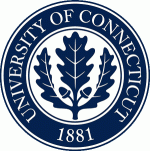Lithuanian President Dalia Grybauskaitė recently signed a decree appointing Marius Jurgilas to the 5-member Board of the Lithuanian Central Bank. Marius was recommended for this appointment by the Advisory Council, a group of prominent economists in the field of finance. He will assume his new responsibilities on May 15.
Marius’ appointment to the Board reflects his extensive background, experience, and expertise in the banking sector. He began developing this expertise during his time as a finance major in the Department of Economics at Vilnius University in Lithuania. In 2001, he joined the Economics Department here at UConn, where he earned his PhD in 2007 with a field in monetary economics. Christian Zimmermann, who is now at the St. Louis Federal Reserve Bank, was his major advisor. His dissertation was on “Interbank Markets under Currency Boards.”
After finishing his PhD, Marius was an assistant professor at Elon University for a year but left Elon to take a position at the Bank of England, where he worked for three years. Most recently, he has worked in the Financial Stability Research Department at the Norwegian Central Bank. He has also spent time at the European Central Bank, SEB Vilniaus Bankas, and Lithuanian Savings Bank, and has been a visiting professor at ISM University of Management ant Economics in Vilnius.
Marius’ research covers a wide range of topics relating to banking and housing. Some of his recent publications include:
JURGILAS, M. & Lansing K. J., (2012 June 25 issue) “Housing bubbles and homeownership returns”, FRBSF Economic Letter, Federal Reserve Bank of San Francisco
GUPTA, R., JURGILAS, M., KABUNDI A. & MILLER M. S. (2012), “Monetary Policy and
Housing Sector Dynamics in a Large-Scale Bayesian Vector Autoregressive Model” International Journal of Strategic Property Management, Vol 16(1): 1-20
GUPTA, R., JURGILAS, M., MILLER, M.S., & WYK, V.D. (2012 January), “Financial Market Liberalization, Monetary Policy, and Housing Sector Dynamics”, International Business and Economics Research Journal, Vol. 11(1).
For more information about Marius’ appointment, click here.
